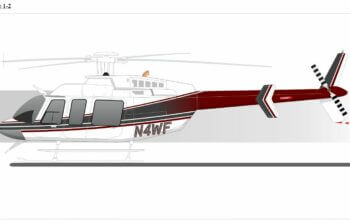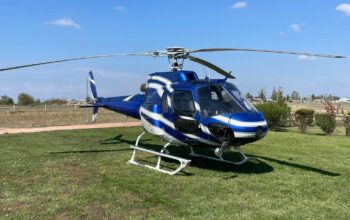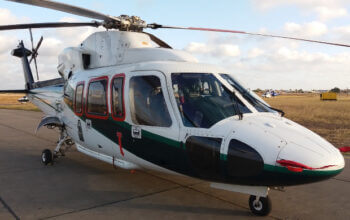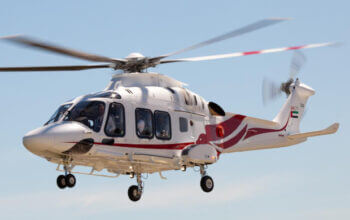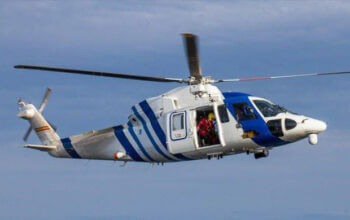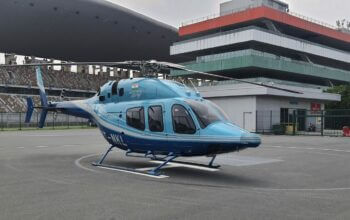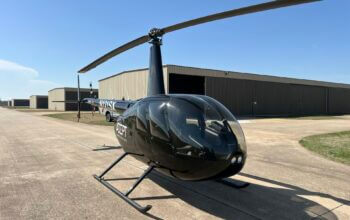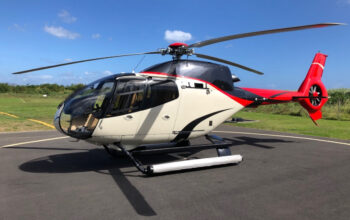Estimated reading time 11 minutes, 24 seconds.
The onset of another cold, snowy Canadian winter is good news for Canada charter airlines. Once again, they will benefit from the flood of shivering Canucks seeking warmer climes in Florida, Mexico and the Caribbean.
That said, Canadian charter companies don’t spend the rest of the year with their airplanes on the tarmac. The key to their success is constant innovation and flexibility in the pursuit of business, 365 days a year.
Sunwing Airlines: The quintessential southern destination charter company
Toronto Sunwing Airlines is what people think of as a typical Canadian charter airline. As part of the Sunwing Travel Group, Sunwing Airlines belongs to a vertically-integrated company that includes tour operators, a national retail travel agency, a hotel management company and a destination management company. Currently, this charter airline flies 23 leased Boeing 737-800s and two 767-300ERs.
We started in 2005 with just two aircraft, said Mark Williams, president of Sunwing Airlines. Since then, we’ve experienced very strong growth in the marketplace.
This growth has been driven by customers buying Sunwing all-inclusive vacation packages, with Sunwing Airlines providing transport to southern locations. But the company has also expanded its reach to Europe, with vacation flights serving Amsterdam, Lisbon, London, Porto, Paris and Rome. By doing so, Sunwing Airlines has expanded its season to encompass the entire year.
Moreover, it doesn’t hurt that Sunwing Airlines offers the kind of free amenities no longer found on commercial economy flights, such as welcome glasses of champagne, hot in-flight meals, non-alcoholic beverages and snacks, wine with meals, headsets and in-flight audio/visual entertainment, including first-run movies.
This really appeals to our customers, said Williams. People are looking for value; five-star service at a three-star price. Because we are not competing head-to-head with commercial carriers on a seat-only basis, we can deliver this value in our all-inclusive deals.
Even with this advantage, Sunwing Airlines finds itself fighting for a limited number of passengers, Williams told Canadian Skies. The vacation charter business is extremely competitive in Canada, and there is surplus capacity in the market. Add the costs of fuel, airports and security, and it is a real challenge at times to make a buck. It doesn’t help that some of our potential traffic is leaking to U.S. border airports, where all levels of government are more supportive of the industry.
Challenges notwithstanding, Sunwing Airlines is a true Canadian success story one that speaks to the potential of charter airlines to turn a profit even in a competitive marketplace.
Flair Air: Southern charters… and then some
Flair Air of Kelowna, B.C., currently owns three Boeing 737-400 aircraft, which it charters to a number of clients, and is in the process of buying a fourth.
President Jim Rogers founded the company in 2003, to fill a gap in Canada large aircraft charter market. Previously, Rogers spent 35 years-plus as a partner in Kelowna Flightcraft with Barry Lapointe. (Kelowna Flightcraft is the exclusive air cargo carrier for Purolator Courier Ltd. and provides dedicated cargo service for Canada Post using DC-10s, Boeing 727s and Convair CV-580s.)
Flair provides charter services to a very wide range of customers, Rogers explained. In the Caribbean region, Flair Air jets can be seen flying on behalf of Cubana Airlines, Cuba national airline. But Flair Air 737-400s are also chartered by First Air, Canadian North, and other commercial carriers who need extra capacity on an ad hoc basis.
That just the start: recently, a Flair Air 737-400 was chartered by a Toronto travel agency to fly a month-long round-the-world’ tour. The company has also provided passenger charters to the Department of National Defence for moving Canadian troops, and to sports teams, TV/film production crews, and travelling orchestras.
The key to operating a successful charter company is flexibility, noted Chris Lapointe, Flair Air general manager. We have to be able to respond to the opportunities that come our way quickly. We also need to maintain strong relationships with people in the commercial airline and travel businesses, so that we are their preferred choice for ad hoc charters.
Staying flexible and fluid drives Rogers’ approach to managing Flair Air. The reason I buy aircraft, instead of leasing them, is that leasing charges are a constant expense whether the aircraft is flying 30 or 300 hours a month, he explained. As well, we are able to manage peak periods by supplementing our regular crews with retired commercial pilots, who fly for us on an as-needed basis. This allows us to blend seasoned professionals with a mix of younger to middle-aged pilots; offering a very well experienced crew base to our clients.
Also on the plus side, being a charter company allows Flair Air to pass rising fuel costs directly through to customers. Meanwhile, regulations are not a problem, since we have been working with Transport Canada for years, and do our best to work within the rules, Rogers said. Add the lack of infrastructure we don’t have ticket agents and the fact that we can fly older yet fuel-efficient aircraft like 737-400s affordably, and our model works well for us.
Air Georgian: Repurposing business jets for charters
Air Georgian is a charter company with a difference. Based in the Shell Aerocentre at Toronto Pearson International Airport, Air Georgian flies charters using corporate aircraft it owns or manages on behalf of owners. (This is not the company only business. Air Georgian also flies scheduled flights within Canada and to the U.S. in partnership with a major air carrier.)
From November to March, a good portion of our charter flying is back and forth to sun destinations in the southern U.S., Mexico and the Caribbean, said Ian Wilson, Air Georgian manager of business development. We also fly down to Nevada and Arizona. We fly more southbound hours during this time than to East and West destinations such as New York and Chicago.
Air Georgian vacation charter business was spurred on by the recession a few years ago. With the slowdown, there were a lot of private and corporate aircraft that were not seeing that much flight time, Wilson told Canadian Skies. It only made sense for the owners to try to earn some revenue from their assets, which is where we come in. By working with us to provide charter services, everybody benefits. The owners are able to improve the return on their capital investments, we are able to earn additional revenue, and our clients get business jet-style service to vacation locations at a price they like.
Operating this kind of charter airline comes with its own challenges attached, including regulatory requirements, juggling available aircraft with bookings, and ensuring access to crews. The commercial carriers have been hiring up skilled pilots as of late, depleting the pool of talent we can tap into, said Wilson. As a result, Air Georgian has implemented certain measures, including a mentor program, to help overcome this particular challenge.
Still, demand for Air Georgian vacation charters has been growing in the past few years; proving that there is a market for this kind of ad hoc travel service. Repurposing business jets for charters is a good sideline for us, Wilson concluded. For people with the resources who do not want to go the conventional charter route, and who value the benefits of private aircraft travel, this is a really attractive alternative.
More than all-inclusives
Flying Canadian vacationers on all-inclusive tours is a big part of the Canadian charter business, as proven by the success of Sunwing Airlines. But the charter business is far more diverse and innovative than most people realize. At its core is a willingness to take risks and serve markets that are missed by both commercial and conventional business aviation carriers.
This is why the charter airline business is so different from the mainstream and why carriers who are willing to break the mould, like Flair Air and Air Georgian, are filling the gaps in the air passenger market.
James Careless writes on aerospace issues for Canadian Skies, Vertical, Rotorhub and Aviation Maintenance magazines. He is a two-time winner of the PBI Media Award for Editorial Excellence.
Notice a spelling mistake or typo?
Click on the button below to send an email to our team and we will get to it as soon as possible.
Report an error or typoHave a story idea you would like to suggest?
Click on the button below to send an email to our team and we will get to it as soon as possible.
Suggest a story


